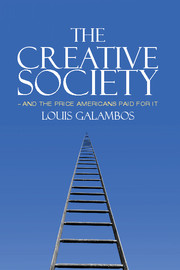Book contents
- Frontmatter
- Contents
- Preface
- 1 1931
- 2 Life, Death, and Learning in the Cities
- 3 Toward a New Economy, 1890 to 1930
- 4 State Crafting – American Style
- 5 Confronting the World
- 6 Winners and Losers, 1890 to 1930
- 7 New Deal Experiments
- 8 Fighting On God’s Side
- 9 The New Aristocracy, 1946 to 1969
- 10 The Suburban Conquest of the 1960s
- 11 Empire in the American Century
- 12 The Tattered Empire of the 1970s
- 13 The Cracked Core
- 14 The American Solution, 1981 to 2001
- 15 Conservatism: Rhetoric and Realities, 1981 to 2001
- 16 The Hegemony Trap
- 17 The American Dream, 1981 to 2001
- 18 The Creative Society in Danger
- Acknowledgments
- Index
- References
3 - Toward a New Economy, 1890 to 1930
Published online by Cambridge University Press: 05 June 2012
- Frontmatter
- Contents
- Preface
- 1 1931
- 2 Life, Death, and Learning in the Cities
- 3 Toward a New Economy, 1890 to 1930
- 4 State Crafting – American Style
- 5 Confronting the World
- 6 Winners and Losers, 1890 to 1930
- 7 New Deal Experiments
- 8 Fighting On God’s Side
- 9 The New Aristocracy, 1946 to 1969
- 10 The Suburban Conquest of the 1960s
- 11 Empire in the American Century
- 12 The Tattered Empire of the 1970s
- 13 The Cracked Core
- 14 The American Solution, 1981 to 2001
- 15 Conservatism: Rhetoric and Realities, 1981 to 2001
- 16 The Hegemony Trap
- 17 The American Dream, 1981 to 2001
- 18 The Creative Society in Danger
- Acknowledgments
- Index
- References
Summary
In 1890, a young scientist at Columbia College, Michael Pupin was just getting settled in the school's new Department of Electrical Engineering. He had recently returned to New York City from Europe with a new bride and a Ph.D. in hand and was optimistic about his ability to make a success of the department despite its primitive facilities. His office and laboratory were housed in a tiny brick building that the students called a “cowshed.” Even more distressing was the lack of equipment and funds. Pupin and his co-teacher had to give public lectures to raise the $300 they needed to buy additional equipment.
Fortunately Pupin was used to hustling. He had first come to the United States from Serbia in 1874, armed with little more than a good secondary education and an intense drive to get ahead in his new home, New York City. This was the New York of Boss Tweed, whose corrupt regime was crumbling even though his ward-level political machine would continue to dominate the city's politics for decades. Many immigrants were drawn to politics, but Pupin applied his sharp mind to languages and science and was able to enter Columbia College, where he graduated with honors in 1883. After two years studying mathematics at Cambridge, he went to Germany and completed a Ph.D. in 1889 at Berlin University. Back in New York, he would remain at Columbia, teaching electrical engineering and mathematical physics until his retirement in 1931.
- Type
- Chapter
- Information
- Publisher: Cambridge University PressPrint publication year: 2011



